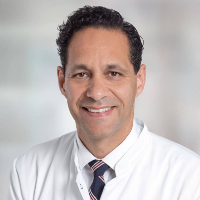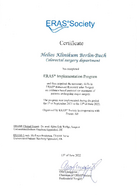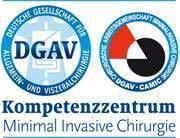Endoscopic Resection for Rectal Cancer treatment in the Best Hospitals in the World
Treatment prices are regulated by national law of the corresponding countries, but can also include additional hospital coefficients. In order to receive the individual cost calculation, please send us the request and medical records.

Department of General, Abdominal Surgery and Surgical Oncology
The Department of General, Abdominal Surgery and Surgical Oncology offers the full range of services in these medical fields. Whenever possible, operations are performed using minimally invasive techniques, which are the gold standard of modern surgery. The outstanding quality of medical care is confirmed by numerous prestigious certificates, including certificates from the German Cancer Society, the German Hernia Society, etc. In addition, the department provides innovative hyperthermic intraperitoneal chemotherapy (HIPEC), which is available only in the most progressive clinics in Europe.







Department of General and Abdominal Surgery, Colorectal Surgery, Hepatopancreatobiliary Surgery, Hernia Surgery and Bariatric Surgery
The Department of General and Abdominal Surgery, Colorectal Surgery, Hepatopancreatobiliary Surgery, Hernia Surgery and Bariatric Surgery provides the full range of surgical treatment in its field of competence. The department's highly qualified surgeons annually perform about 2,000 surgical interventions. Extensive clinical experience allows the specialists to perform even particularly complex operations. The department’s advanced operating rooms serve for surgery to treat gastrointestinal diseases, liver, gallbladder, bile duct, pancreatic, rectal, anal and colon pathologies. The medical facility also successfully performs operations to treat hernias: inguinal, umbilical, and anterior abdominal wall hernias. In addition, the department's doctors deal with the surgical treatment of morbid obesity. Minor traumatic laparoscopic interventions are considered the gold standard, which guarantee a patient minimal risks and rapid postoperative restoration. Surgeons tell the patient in detail about their upcoming treatment and, in every possible way, support them in their recovery.







Department of General and Abdominal Surgery, Colorectal Surgery, Endocrine Surgery and Hernia Surgery
The Department of General and Abdominal Surgery, Colorectal Surgery, Endocrine Surgery and Hernia Surgery offers the full range of modern surgical interventions in the areas of its specialization. Every year, the medical facility performs more than 2,500 surgical interventions on an inpatient and outpatient basis. The department has vast clinical experience in the field of minimally invasive surgery, which allows the patient to avoid severe pain and prolonged hospitalization. In addition, the department offers robotic surgery using the most modern models of the da Vinci surgical system. The medical facility has the status of the Reference Center for Minimally Invasive Surgery and Hernia Surgery. Surgical treatment of cancer is one of the department's clinical priority focuses. A large number of da Vinci robot-assisted interventions are performed here for gastrointestinal cancers. The department holds a leading position in the use of the da Vinci surgical system in the treatment of rectal and sigmoid cancer patients. The operating rooms of the medical facility are equipped with the very latest technology, while hygiene and safety standards are at the highest level as well. Prior to surgery, the patient undergoes a comprehensive examination. Doctors also assess the risks of the upcoming operation and its expected results. With appropriate clinical indications, preference is always given to minimally invasive surgery.






Colorectal (rectal) cancer is the widespread condition. Screening of the gastrointestinal tract pathologies is recommended for all people with symptoms of gastrointestinal tract disturbances.
Until now, rectal cancer treatment included resection of the intestine and chemotherapy if cancer has metastasized. Recently, endoscopic resection has been considered for patients with early stages of rectal cancer, as a minimally invasive rectal cancer treatment method.
Overview
As a rule, colorectal cancer develops as a result of malignant transformation of adenomatous polyps. Approximately 80% of colorectal cancer cases are sporadic, 20% of them develop due to the hereditary predisposition. Other risk factors include chronic ulcerative colitis and Crohn's disease. The risk of colorectal cancer also increases in people with unhealthy diets.
The risk of developing colorectal cancer is increased with insufficient intake of plant fiber, high intake of animal proteins, fats, and refined carbohydrates. Carcinogens may be found in food products, but are more likely to be synthesized by the gastrointestinal bacteria in response to intake of certain food substances. The exact mechanism for the synthesis of carcinogens is still unknown.
Colorectal cancer spreads by the direct growth of atypical cells into the intestinal wall, by hematogenous metastasizing and metastases spreading to regional lymph nodes.
Clinical signs
Colorectal cancer is characterized by slow growth. Thus, it takes quite a long time before the tumor reaches a large size and causes the first symptoms. Clinical manifestations depend on the location, type, and spreading of the tumor.
The right sections of the large intestine have a larger diameter and a thinner wall and contain liquids, so obstruction develops rarely. Latent blood loss is usually observed. The subjective symptoms may include general fatigue or severe anemia. Pain often appears with the spread of the rectal cancer process.
The descending colon has a smaller lumen, the feces there are watery. Therefore, colorectal cancer in this region tends to create an obstruction earlier than in the ascending colon. The first manifestations may be a partial obstruction with the appearance of colicky pains in the abdomen or complete obstruction.
In rectal cancer, the first symptom is usually a blood present in the feces. In any case, when blood is found in the feces, even with an established diagnosis of hemorrhoids, colorectal cancer diagnosis must be excluded. The feeling of incomplete emptying of the rectum may also be noted.
In some cases, the clinical manifestations such as the enlargement of the liver, ascites, and the lymphatic nodes may be the first signs of the tumor metastasizing.
Diagnostics
For patients from the moderate-risk group, screening for colorectal cancer should begin at the age of 50.
There are several screening options for rectal cancer, including:
- Colonoscopy. Colonoscopy remains the most informative method of diagnostics.
- Fecal occult blood test (fecal immunochemical tests are preferred). Fecal blood immunochemical tests are more sensitive and specific to human blood than other tests. However, both positive and negative test results do not confirm or exclude the possibility of rectal cancer.
- Sigmoidoscopy.
- CT colonography (virtual colonoscopy). CT colonography (virtual colonoscopy) allows doctors to obtain 2D and 3D images of the colon. High-resolution images are almost as informative as the endoscopic examination. CT colonography is a promising screening method in the presence of contraindications to endoscopy or refusal to perform it, but it has a lower sensitivity and precision. This test does not require anesthesia but requires careful bowel preparation. Additionally, unlike conventional colonoscopy, it is not possible to perform biopsy during the diagnostic procedure.
- Fecal DNA test.
When diagnosing colorectal cancer, abdominal CT scans, chest X-rays, and laboratory tests should be done to detect possible signs of the metastatic process, anemia, and to assess the patient's general health state.
Colorectal cancer removed during surgery is examined for gene mutations which cause Lynch syndrome. People who have relatives with colon, ovarian, or endometrial cancer diagnosed at an early age, or who have few relatives with these conditions, should be tested for Lynch syndrome as well.
Patients who have a first-degree relative with colorectal cancer diagnosed under the age 60 should undergo a colonoscopy every 5 years starting at age 40 or every 10 years after diagnosis of the relative. Screening of patients differs depending on the concomitant pathologies, if any are present.
Endoscopic resection
Early colorectal cancer is defined as cancer that is limited to the mucosa or submucosa. The detection of early colorectal cancer has been increasing, and some cases of early colorectal cancer can be treated with endoscopic mucosal resection.
Endoscopic resection is a minimally invasive method of surgical intervention with minimal risks of postoperative complications and recurrence of the tumor process. The method is based on the use of an endoscope, through which a loop electrode is inserted into the patient's large intestine, allowing to detect and remove malignant neoplasms.
Endoscopic resection is indicated for lesions of the mucosa or submucosa of the colon in which the risk of lymph node involvement is minimal.
Endoscopic mucosal resection is a less invasive alternative to the open surgery. The doctor may recommend the procedure to remove certain early-stage cancers or precancerous pathologies.
Endoscopic mucosal resection is used in the process of removing pathological neoplasms and is associated with risks, including a high probability of bleeding. Also, it is used to remove large or multiple rectal polyps.
Why are polyps important to treat?
A polyp is a mass that grows inside the lumen of the intestine. During the removal surgery, various processes inside the formation can be detected. This can be an ordinary thickening of the mucosa, edema, and inflammation in the mucosa in the form of a thickened fold, tumor-like growths of various tissues, submucosal formations such as lipoma, and, ultimately, it can be a cancerous tumor. Since various processes can develop inside this polyp, they must be studied during the histological examination, as a rule, performed before surgery.
The term "polyp" is used to define the pathological process of intestinal mucous tissues, which has a benign nature. The neoplasm itself does not pose a threat to the patient's life and health. However, there is a risk of transformation of polyps into a malignant tumor.
There are two types of endoscopic resection: endoscopic mucosal resection and endoscopic submucosal dissection.
Endoscopic submucosal dissection is a removal of a large area of the affected mucous membrane with a neoplasm and part of the submucosa with its muscle mass.
Gastrointestinal endoscopic mucosal resection is a procedure to remove early-stage cancer. Endoscopic mucosal resection can be used for both diagnosis and treatment.
For diagnostic purposes, endoscopic mucosal resection is used in single neoplasms. If histological examination becomes necessary, then large polyps with the suspicious structure are removed.
As for the treatment, small polyps are subject to endoscopic mucosal resection, but only if serious complications do not follow surgical manipulations. The method of endoscopic diagnostics and treatment is used when formations are superficial. If the formations are solitary or are located in groups, then the patient requires a surgery.
Endoscopic resection is a surgery prescribed when the volume of a polyp does not exceed 3 cm. Endoscopic resection allows removal with particular accuracy, due to optical equipment, displaying the resulting image on a computer. An endoscope is a device with probes and tips with optics and lighting. The endoscope has special passages for the introduction of surgical instruments. Endoscopic resection can be combined with conventional surgery or other types of rectal cancer treatment.
Treatment of malignant polyps with endoscopic resection does not worsen surgical and general clinical outcomes in cases of subsequent surgery. Mortality and morbidity of the procedure are low, so endoscopic resection generally is chosen in the presence of risk factors for residual cancer.
Endoscopic mucosal resection is performed with an endoscope equipped with a light and video camera. During endoscopic mucosal resection, the doctor passes the endoscope up through the anus to reach the colon. The doctor then inserts instruments through the tube to perform the procedure.
Endoscopic mucosal resection is very often used for rectal cancer treatment. However, the doctor may also harvest samples of tissue during the procedure. Examination of this tissue can help the doctors make a diagnosis. Endoscopic mucosal resection can help determine if cancer has spread to tissues beneath the digestive tract lining.
The optimal method for removing polyps in the intestine is selected individually, taking into account the characteristics of a particular clinical case. In general, endoscopic mucosal resection is a sparing method of removing benign neoplasms. After surgery, patients fully recover within one or two weeks. During the rehabilitation period after endoscopic mucosal resection, patients are recommended to follow a balanced diet to normalize the digestive process.
The endoscopic mucosal resection procedure also includes a pathological examination of the removed tissue. That is, after the completion of the surgical intervention, the biological material is sent to the laboratory to determine the presence of malignant transformation in the tissues.
Endoscopic mucosal resection of the colon and rectum is contraindicated in patients with poor blood clotting.
The price for treatment with endoscopic resection
The price for the treatment of rectal cancer in hospitals listed on the Booking Health website is relatively low. With Booking Health, you can undergo rectal cancer treatment in the best hospitals in the world at a lower cost.
The cost varies, as the price for treatment depends on the hospital, the diagnosis, and the complexity of treatment:
- The price for treatment in Germany is from 24,233 EUR to 37,612 EUR.
- The price for treatment in Israel is from 20,965 EUR to 21,288 EUR.
- The price for treatment in Turkey is from 11,888 EUR to 12,000 EUR.
The final cost may differ from the prices above. To make sure that the treatment is suitable for you, contact us by leaving the request on the Booking Health website.
Where can I undergo rectal cancer treatment abroad?
The best success rates in endoscopic resection are demonstrated by:
- Academic Hospital Brothers of Charity Munich, Germany
- University Hospital of Ludwig Maximilian University Munich, Germany
- Charite University Hospital, Germany
- University Hospital Ulm, Germany
- Tel Aviv Sourasky Medical Center, Israel
- Medipol Mega University Hospital Istanbul, Turkey
You can check out the full list of hospitals on the Booking Health website.
How can I undergo endoscopic resection in the best hospitals in the world?
It is not easy to choose the right hospital that performs endoscopic resection procedures. It is necessary to have experience and accurate information on the success rates in rectal cancer treatment in the particular hospital.
We may help you during this difficult period and take on all the troubles. Booking Health will select a hospital, taking into account your wishes and the indications for rectal cancer treatment.
We have up-to-date information on rectal cancer treatment in the best hospitals in the world. You can be free of unnecessary troubles, while Booking Health takes care of all organizational issues. Our goal is to find the best facility for rectal cancer treatment for you.
Rectal cancer can be treated! The earlier you start the treatment, the higher the chances of success. We will provide you with information on the hospitals, the cost of treatment, or any other.
Leave a request on the Booking Health website and our manager will contact you shortly.

